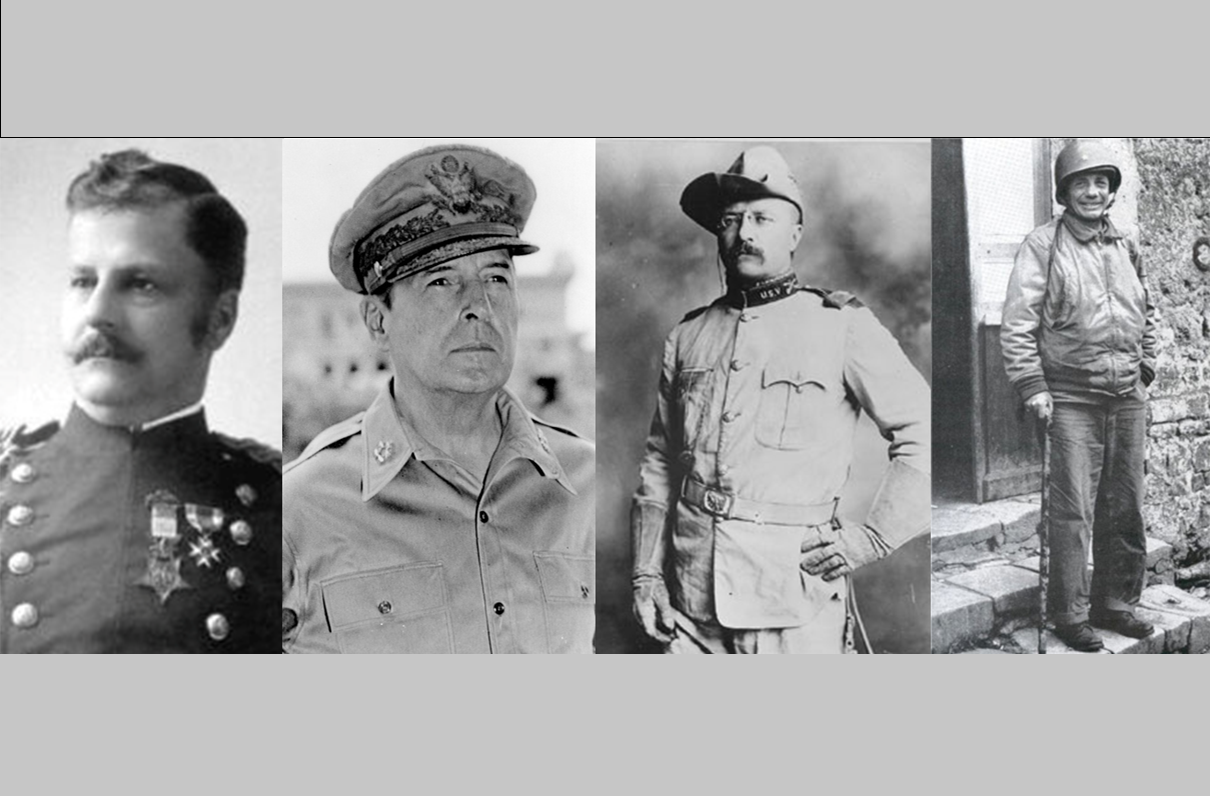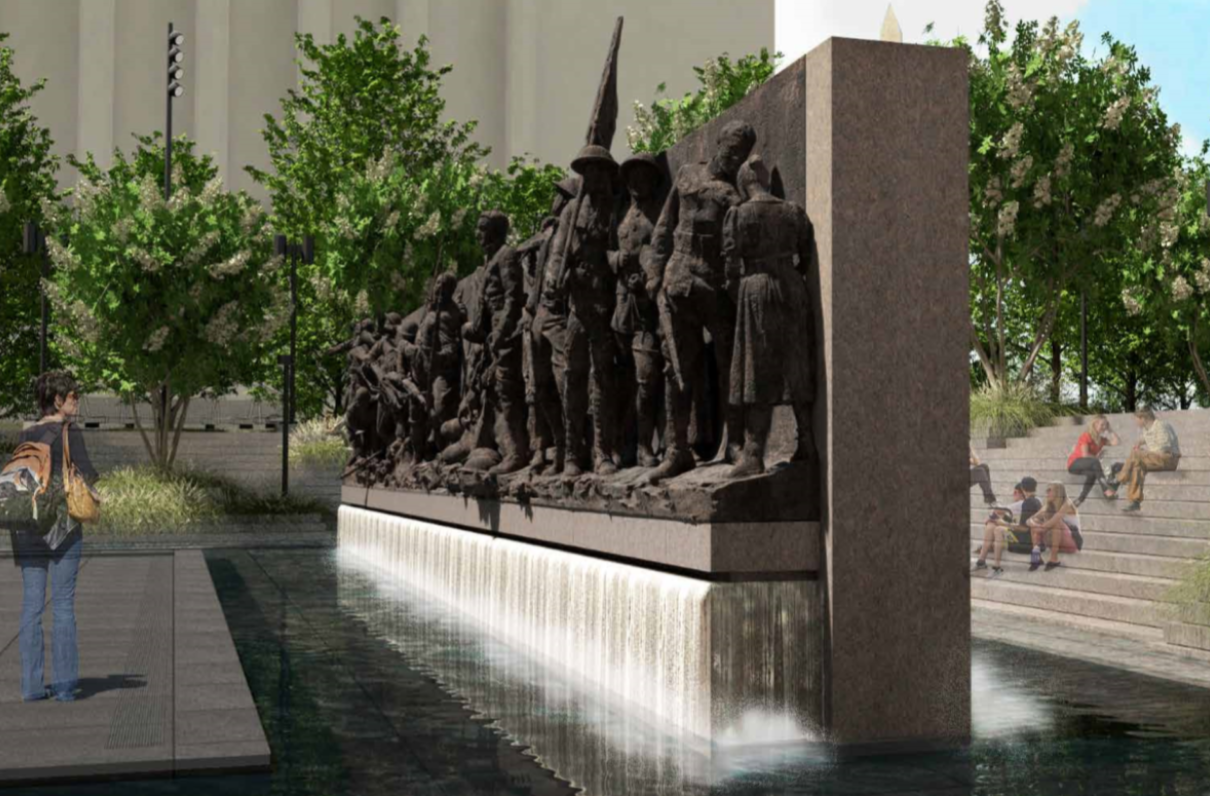By Dr. Wayne Curtis
Only two father-son combinations have been awarded the Medal of Honor since its inception in 1863. Arthur and Douglas MacArthur and Theodore Roosevelt and Theodore Roosevelt, Jr., were awarded this signal of honor for their gallant efforts dating from the Civil War through World War II.
MacArthur Family
Arthur MacArthur served during the Civil War assigned to the 24th Wisconsin Volunteer Infantry Regiment. When he was just an 18-year-old lieutenant, MacArthur “seized the colors of his regiment at a critical moment and planted them on the captured works on the crest of Missionary Ridge.” Despite his heroic efforts, he was not awarded the Medal of Honor until 1890. MacArthur left the service in June 1865 as a lieutenant colonel, and after a brief study of law, re-entered the Regular Army in 1866, ultimately retiring in 1909 as a lieutenant general.
His son, Gen. Douglas MacArthur, was nominated for the Medal of Honor twice for service as a brigadier general in World War I, before receiving it for his service in the defense of the Philippines in 1942. His Medal of Honor citation noted his “conspicuous leadership in preparing the Philippine Islands to resist conquest, for gallantry and intrepidity above and beyond the call of duty in action against invading Japanese forces, and for the heroic conduct of defensive and offensive operations on the Bataan Peninsula…. His utter disregard of personal danger under heavy fire and aerial bombardment, his calm judgment in each crisis, inspired his troops, galvanized the spirit of resistance of the Filipino people.”
The award, however, was not without controversy. Many military leaders, including Gen. Eisenhower, opposed it. Opposition to the award revolved around the belief that his actions did not meet the standard for the award in that he had not performed an act of valor. As the Japanese forces steadily advanced in the Philippines, President Franklin Roosevelt ordered Gen. MacArthur to relocate to Australia. On March 12, 1942, MacArthur departed, under the cover of darkness, for Australia with his family and staff. He left behind Lt. Gen. Jonathan Wainwright and his greatly outnumbered troops to fight on Bataan. Near starvation and short of ammunition and other supplies, Wainwright surrendered the garrison, and he and those with him suffered misery and death as prisoners of the Japanese.
Army Chief of Staff George Marshall, who personally authored the citation, overruled opposition to MacArthur’s nomination, and justified it by pointing out that some past awards had been made to individuals who had not been responsible for front-line achievements. Critics contend the award was made for political reasons and some maintain it was in response to a propaganda campaign waged by Japan, Germany, and Italy that characterized MacArthur as a “coward” and “deserter.” Regardless of the circumstances, the MacArthur duo became the first father and son to be awarded the Medal of Honor.
Roosevelt Family
Theodore “Teddy” Roosevelt has the distinction of being the only U.S. president to have received the Medal of Honor. The Medal was for his actions as a member of the 1st Volunteer Cavalry, known as the “Rough Riders,” during the Spanish-American War: “Lieutenant Colonel Roosevelt, in total disregard for his personal safety, and accompanied by only four or five men, led a desperate and gallant charge up San Juan Hill, encouraging his troops to continue the assault through withering enemy fire over open countryside. Facing the enemy's heavy fire, he displayed extraordinary bravery throughout the charge, and was the first to reach the enemy trenches, where he quickly killed one of the enemy with his pistol, allowing his men to continue the assault. His leadership and valor turned the tide in the battle for San Juan Hill.”
Like that of Gen. MacArthur, President Roosevelt’s nomination was marred by controversy. After the action was over, four general officers recommended that he receive the award. But the recommendation was rejected by a board of officers, though the reason for the denial was not documented. Some historians contend the board concluded President Roosevelt's conduct in Cuba was admirable but not worthy of the Medal of Honor. They believed when Roosevelt reached the hilltop, the main body of the Spanish was almost all gone, having retreated toward Santiago.
After numerous lobbying attempts over several decades after Roosevelt’s death, Congress repealed the statute of limitations on military decorations in 1996. Though the Army opposed retroactive recognition, legislation passed in late 1998 provided for appointment of a board to review the matter. The board recommended approval and President Roosevelt was awarded the Medal of Honor two years later on Jan. 16, 2001.
Forty-six years after President Roosevelt’s actions on San Juan Hill, his son received the nation’s highest military award. Theodore Roosevelt, Jr., a Distinguished Service Cross recipient of World War I and one of the founders of the American Legion, was the only general officer and the oldest person at 56 years of age to land with the first wave assaulting enemy beaches on D-Day. A reservist, he was called to active duty as a colonel and soon promoted to brigadier general. Twice denied his verbal requests to accompany the first wave on Utah Beach, his written request was approved. By coincidence, his son, Capt. Quentin Roosevelt II, landed with the first wave on Omaha Beach.
Armed only with a pistol and a cane — the latter was used for arthritis as a result of injuries received in World War I — Brig. Gen. Roosevelt “repeatedly led groups from the beach, over the seawall and established them inland. His valor, courage, and presence in the very front of the attack and his complete unconcern at being under heavy fire inspired the troops to heights of enthusiasm and self-sacrifice. Although the enemy had the beach under constant direct fire, Brig. Gen. Roosevelt moved from one locality to another, rallying men around him, directed and personally led them against the enemy. Under his seasoned, precise, calm, and unfaltering leadership, assault troops reduced beach strong points and rapidly moved inland with minimum casualties.” When Brig. Gen. Roosevelt realized the troops had landed about a mile off course, he is quoted as saying, “We are going to start the war right here.”
Unfortunately, Brig. Gen. Roosevelt died from a heart attack before he received the medal. On the day of his death, July 12, 1944, he had been selected for promotion to major general and command of the 90th Infantry Division. Several general officers served as pall bearers at his funeral and he is buried alongside his younger brother, Quentin, a casualty of World War I, in France.
The four recipients of the Medal of Honor represent two distinguished American families that faithfully served the nation for decades. Despite their record of service, people have speculated if all of the awards would be made under today’s standards. Regardless of reservations that linger, history currently records them as the only father-son recipients of the nation’s highest military award.
Wayne Curtis, Ph.D., a former dean of Troy University business school and a retired Army Lt. Col., is a long-time member of MOAA.


